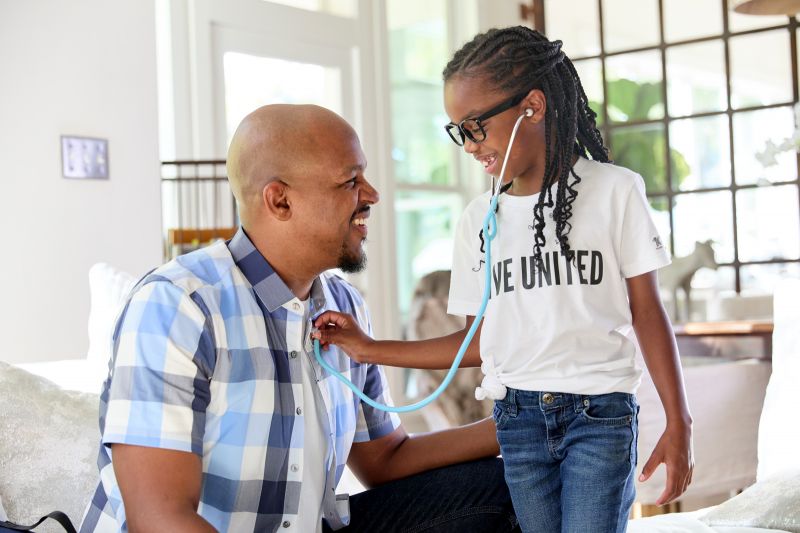Raising Awareness of Texas’ Dire Maternal Health Statistics

Across Texas, maternal health has become a crisis. New mothers are dying at a shocking rate in our state, and it’s vital for all of us to do everything in our power to reverse this trend.
At United Way of Metropolitan Dallas, we drive transformative change in the areas of education, income and health—the building blocks of opportunity. One of our Aspire United 2030 goals is to increase to 96% the percentage of North Texans with access to affordable health insurance. An urgent component of that work involves raising awareness of harmful health disparities, providing new moms and mothers-to-be with the resources necessary to thrive, and advocating for legislation that expands healthcare access and brings greater equity to maternal healthcare.
Read on to learn more about the state of maternal health in Texas, to hear about the experience of one local mom and to discover how United Way works to improve maternal health in our communities.
Maternal Health Is in Crisis
The United States is failing mothers who are about to give birth or who are postpartum. Our country has the highest maternal death rate among similarly developed countries and is the only industrialized nation where such deaths are rising.
Black mothers fare the worst of any ethnic group in this country. In 2020, the maternal mortality rate for Black women was three times the rate for white women. The high rates of maternal mortality among Black women span across income level, education level, socioeconomic status, general overall health, access to prenatal care and mental health status.
According to the CDC, multiple factors contribute to these disparities, including:
- Lower quality healthcare
- Structural racism
- Implicit bias from healthcare providers
- Underlying chronic conditions
The situation is even more dire in Texas, which is the state with the highest Black maternal mortality rate. That number has now risen to 117.3 deaths per 10,000 delivery hospitalizations.
Mothers of color in our state face barriers to quality care that most of their white counterparts have never experienced. Research from the Kaiser Family Foundation shows that Black patients are more likely to feel that a healthcare provider doesn’t believe their symptoms or pain level. Black women typically begin receiving prenatal care much later in their pregnancy—if at all. Meanwhile, patients of color are also significantly more likely to experience mistreatment, such as shouting or scolding, ignoring or refusing requests for help.
A North Texas Mom Tells Her Story
To commemorate Black Maternal Health Week, United Way hosted a Black Maternal Health Lunch & Learn on April 14 for community partners, government agencies and local parents to learn more about this important issue.
During the event, one inspiring North Texas mom shared her story of navigating the healthcare system while pregnant. As a first-time mom, Lasean accessed services and resources through our partner Abide Women’s Health Services, which offers culturally informed prenatal and postnatal care. She was also seen postnatal by a nurse with our partner Metrocare Services.
“I was pregnant and new to Dallas, and I had no idea what resources were around me,” Lasean shared. “I was terrified of hospitals, because of all the disparities and the horror stories that you hear about women of color. So I Googled ‘prenatal care POC near me’ and that’s how Abide showed up on my radar.”
Lasean said the first time she visited Abide, she immediately felt comfortable and safe.
“I felt confident in a place where I could just be a pregnant person of color,” she said. “They were very informative and always checked on me. Our visits were very cultural; we understood each other in ways that I wouldn’t have gotten in traditional care. [My doula] understood my preferences and my natural birth plan, and she supported everything that I wanted to do. Being around women who look like you, who have done the things you’ve done…[it] boosted my confidence that I could actually be a mom. It’s very communal and you feel very supported.”.
Lasean also told her harrowing story of giving birth. She had made her birth plans at a Dallas-area birthing center, but things quickly went off course once she started feeling contractions and rushed with her partner to the center. Although she was in labor, the doctor told her to go home and wait until she was further along. On her way home, she had to sit in rush-hour traffic for an hour.
“To me, they didn’t do their jobs. And within 30 minutes of getting home, I had my baby in the bathtub,” she said. “With no medical supervision—nothing. It blows my mind to this day. Luckily there were no complications, no issues. But the flipside to that trauma is that anything could have happened to us.”
Lasean’s experience illustrates how traditional healthcare providers can so easily discount the needs of moms of color, which can lead to dangerous, and even deadly, consequences.
Working Together to Improve Maternal Health
At United Way of Metropolitan Dallas, we recognize that maternal mortality is unacceptably high in Texas, but it doesn’t have to be that way.
“One of the things that stood out for us is that 90% of pregnancy related deaths are preventable,” said Nailah Johnson, director of the Texas Home Visiting Program at United Way of Metropolitan Dallas. “So, we’re really focused on catching those mamas in that prenatal stage to ensure that they have the support they need. Our goal is to share and understand these disparities and inequities that are occurring in Dallas County and work with our partners in the community to provide the services and resources that families in North Texas need to thrive.”
United Way leads and collaborates on several initiatives that support improved care for moms and moms-to-be in North Texas. This work includes:
- Doorways to Health: This partnership with Abide Women’s Health Services and Metrocare Services seeks to improve the maternal health outcomes of women in Dallas. Doorways to Health offers a variety of resources and programming, including home visiting and holistic maternal healthcare services, to ensure new and expecting mothers have the support necessary to thrive.
- Family Wellness Council: This collaborative partnership works to ensure a strong start for all families living in North Texas. The council engages multiple sectors across North Texas to focus on improving health equity and providing high-quality support for parents and healthcare providers. The council includes the Help Me Grow North Texas and Health Initiatives Workgroup, which includes about 25 nonprofits serving local families.
- Advocating for expanded healthcare coverage: Notably, more than half of maternity-related deaths in the U.S. happen in the 12-month postpartum period, which indicates the importance of postpartum health coverage. Securing 12-month health care coverage for new moms is part of our goal to ensure that all our neighbors have access to the resources needed to live longer, healthier lives. During the current Texas legislative session, we signed on to back a bipartisan bill (HB 12) that would allow moms to keep Medicaid insurance for one year after pregnancy or miscarriage, instead of just two months. We also support HB 2873, which requires the state to develop a strategic plan for improving maternal health outcomes under programs administered by the state to women during and following pregnancy.
Let’s Support Improved Healthcare for Pregnant Women
Join our community-wide effort to improve access to healthcare in North Texas. Here are two ways to get involved right now:
- Advocate for pregnant women. During this year’s legislative session, United Way is working with hundreds of advocates to speak up and speak out on important policies that directly impact North Texans. With HB 12 and HB 2873 being considered, now is the time to contact your representatives. Sign up here to receive our Advocacy Alerts, and we’ll let you know how and when to contact your lawmakers to make the biggest impact possible.
- Make a donation to support programs that improve access to healthcare. When you invest in United Way, you create lasting change right here at home. Your donation will support programs like Doorways to Health and ensure all North Texas families have the opportunity to thrive. Click here to invest today.
Tags

Invest in Improved Access to Healthcare
Together, we can ensure that every North Texan has access to the healthcare resources necessary to thrive. Your investment in United Way of Metropolitan Dallas supports programs and partnerships that bring greater equity to healthcare in our community.


